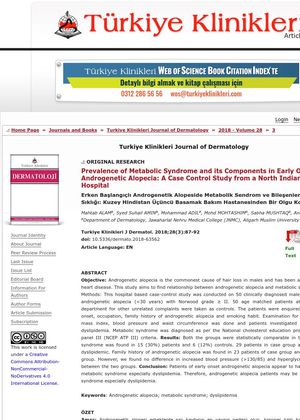Prevalence of Metabolic Syndrome and Its Components in Early Onset Androgenetic Alopecia: A Case Control Study from a North Indian Tertiary Care Hospital
January 2018
in “
Turkiye Klinikleri Journal of Dermatology
”

TLDR People with early onset androgenetic alopecia may have a higher chance of metabolic syndrome, especially dyslipidemia.
Five years ago, a study was conducted on 100 participants, 50 of whom were male patients with early onset androgenetic alopecia and 50 were age-matched controls. The study found a higher prevalence of metabolic syndrome, particularly dyslipidemia, in the patient group. Specifically, metabolic syndrome was diagnosed in 30% of the patients and 12% of the controls, while dyslipidemia was found in 29 patients and 16 controls. However, there was no significant difference between the two groups in terms of high blood pressure and hyperglycemia. The study concluded that patients with early onset androgenetic alopecia may have a higher frequency of metabolic syndrome, especially dyslipidemia.





